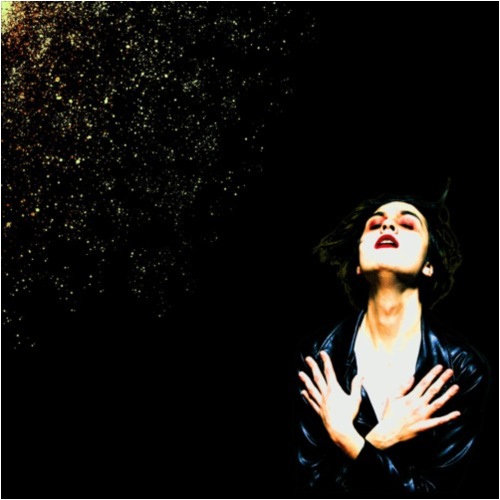Henry Ryeder’s newest EP, Boy Image, has this very cool and glamorous energy. The music feels as though it’s something relaxed but refined, and a mirror of dance-glam’s aesthetics with different and interesting sounds. Off of Boy Image, “Love Ain’t No Open Door” keeps this energy with a track that maintains a multitude of moods while keeping a shiny sound up front.
The track maintains this effortless cool across the entire runtime. Between Ryeder’s cool tones and the dynamic synths, there’s a certain flashiness on display. The cadence of the lyrics also reinforces a feeling of movement throughout the song. The kicking drums before the first pre-chorus feels like the audience is whisked along in a midnight drive around some big city. However, Ryeder never lingers on any particular sound for too long: the track is diverse between energetic, building verses, reserved but optimistic choruses, and a massive swelling of sound and emotion towards the end. The shifts in the background sound signal each switch between verse, chorus, and bridge in a very elegant way. Elegant and exciting, that’s the best way to explain how it feels to listen along on “Love Ain’t No Open Door”. Alongside the circular lyrics describing the singer’s repeated meets and relationships with the same person, we get this feeling of following Ryeder’s voice.
When interpreting lyrics, there’s a distinction between the audience of the song and the audience of the singer: are they singing to us, or to someone else and we’re listening along? Ryeder brought this to my attention by writing and creating such a fun and energetic sound, but lacing the lyrics with a sort of venom. (“I’ll never be the one to up and scold you/but I’m always here to be the queer to say ‘I told you’” is one particularly memorable line.) It made me think, if we as a listener were supposed to be the target of the lyrics, that would clash with how catchy and clean the sound of the song is. It gives this feeling of listening to a conflict from a distance, and makes the piece overall much more entertaining to listen to. Besides, it would be a shame to exchange these fun synths and kicking drums for something more dour and cynical. “Love Ain’t No Open Door” is a catchy, sparkly, bright song and bodes well for the rest of the songs on Boy Image.
What were your primary inspirations for Boy Image?
During the 2020 lockdown I went through a bit of a transformational period as most human beings on the planet did. I had a pretty shut-in childhood so the lack of social contact during the pandemic was a very unnerving echo of some painful memories. From those lockdown feelings came this sense of nostalgia for a world I felt I didn’t get to appreciate in the moment. When I started reading Lizzy Goodman’s Meet Me in the Bathroom (about the indie music scene of the 2000s), I felt an immediate urge to throw my creative self into exploring the art and style of that period, all while winking and nodding to that scene’s (and ultimately any “scene’s”) shortfalls and anachronisms. That’s where Boy Image came from: someone yearning to find themselves in the dusty ruins of a world they never inhabited.
Where are you most comfortable when it comes to making music? Singing, or maybe something else?
Though I love all parts of the music-making process, I think I get the most thrill out of singing and playing bass. I’m able to just exist in the moment when I’m singing and I think that freedom is a testament to how informal my musical education has been. Playing bass satisfies a more crafty, calculating part of me. I’m obsessed with harmony and steering the arrangement of a piece from the low end is something that keeps me on my toes while doing it.
Do you have a particular scene or image in mind for “Love Ain’t No Open Door?” What about other tracks on Boy Image?
“Love Ain’t No Open Door” is definitely inspired by the Strokes’ lead singer Julian Casablancas. As far as specific images I went about the song as if it were a lo-fi karaoke VHS of someone singing a 2000s rock song – a bedroom indie take on an earlier New York sound. For the other tracks, I imagined some ghostly entity trying on the outfits of different rock stars from that 2000s era, attempting to communicate something through those aesthetics.
Has the music you’ve made changed how you view the world? Do you see things differently or in a new way after finishing the work on a song?
These songs were such a cathartic expression of two years of feelings that my worldview affected the music more than the music affected my interpretation of the world. In the future I’m pursuing a more expressionist relationship between my music and me, I find that to be more challenging and interesting than what testimony has to offer at the moment.
What kind of person do you see sitting down and listening to your music? Do you think of that person while you write?
I definitely want listeners to feel comfortable in taking ownership of my work in as interactive a way as possible. I think the idea of the separation between listener and stage performer is very antiquated. I don’t think that the way social media is often used by stars right now is any different either; I want listeners to have as much say in defining Henry Ryeder as I do. I think that’s the real 21st century way of approaching things; understanding the artist themselves as a platform, as opposed to simply exploiting a platform.







